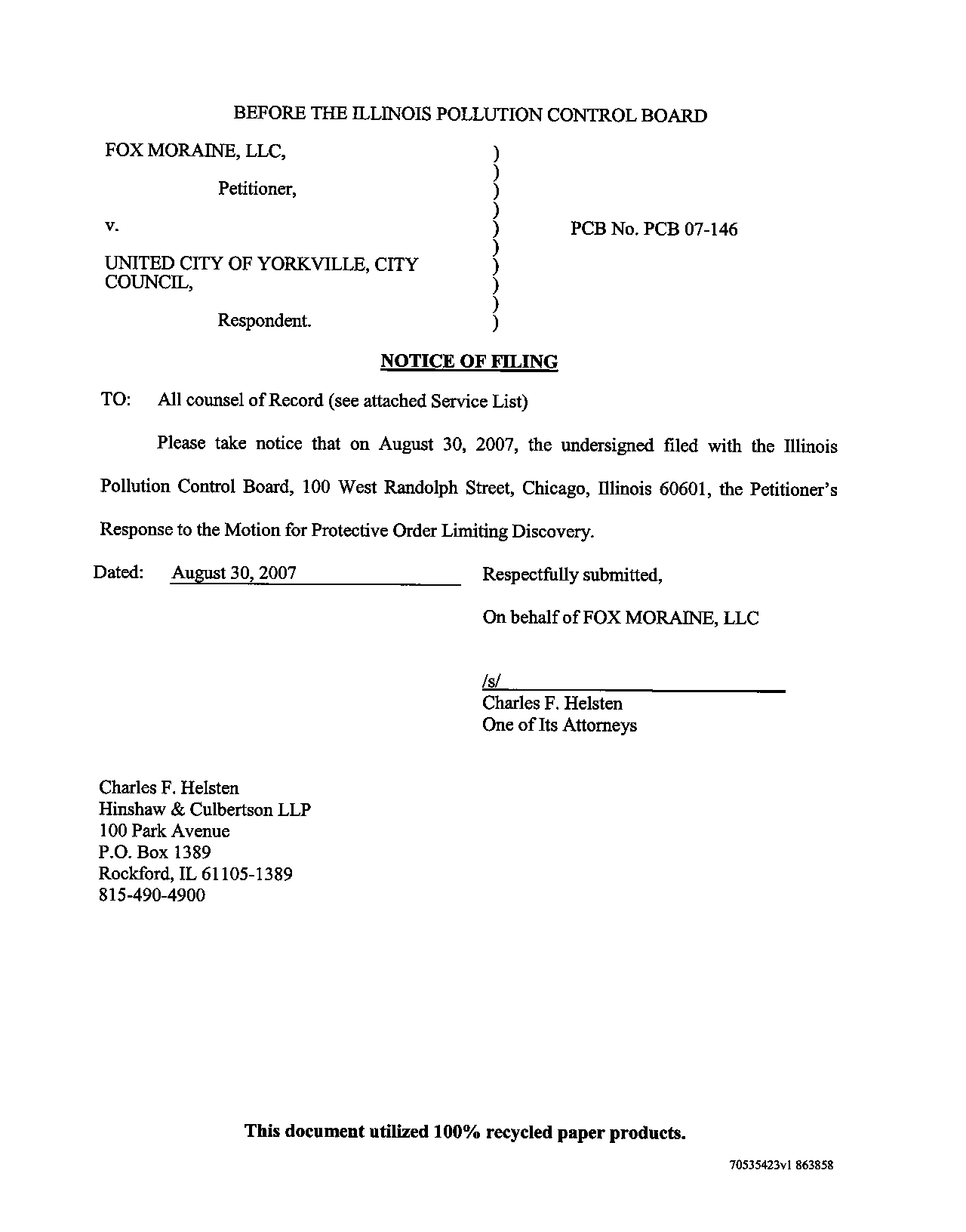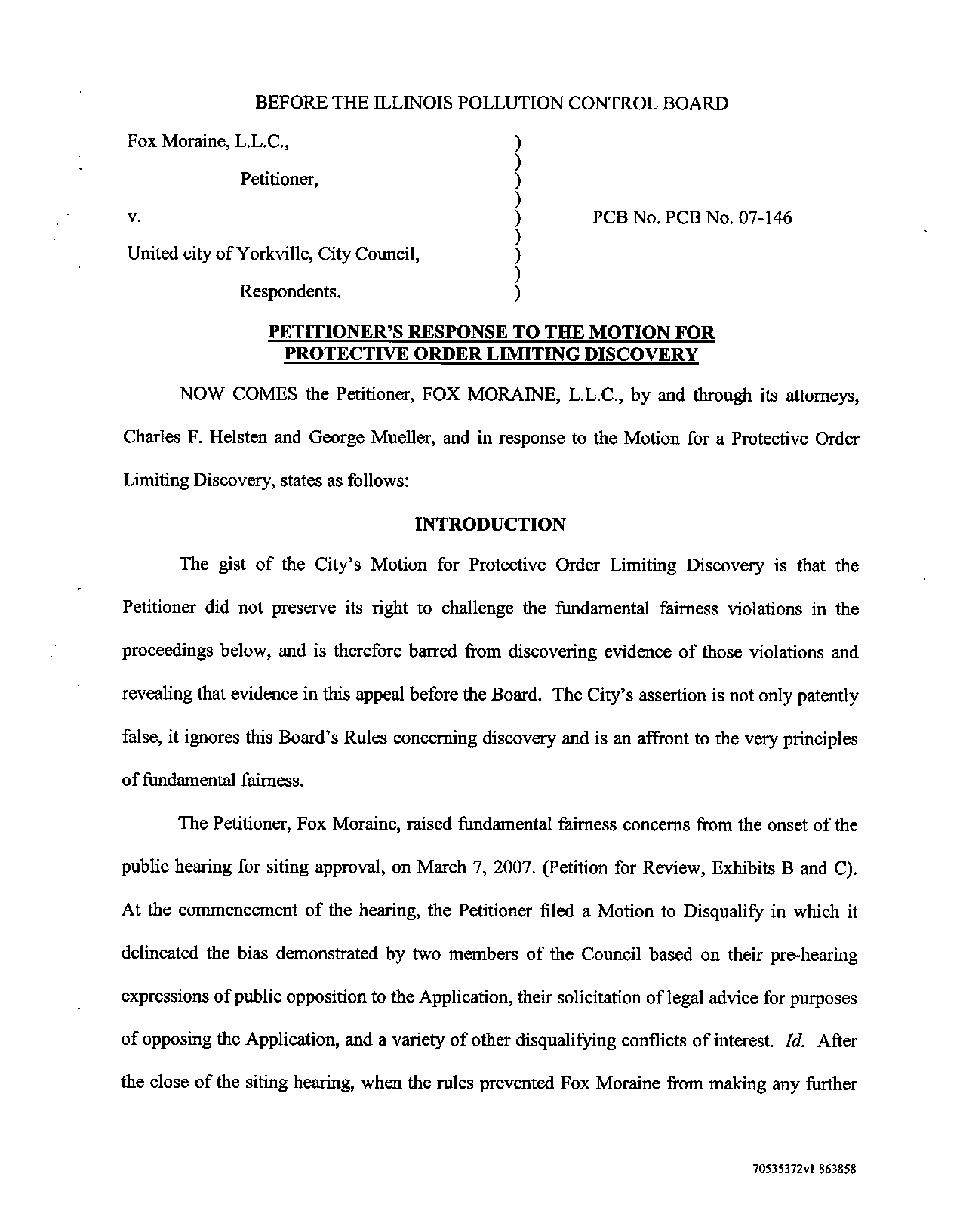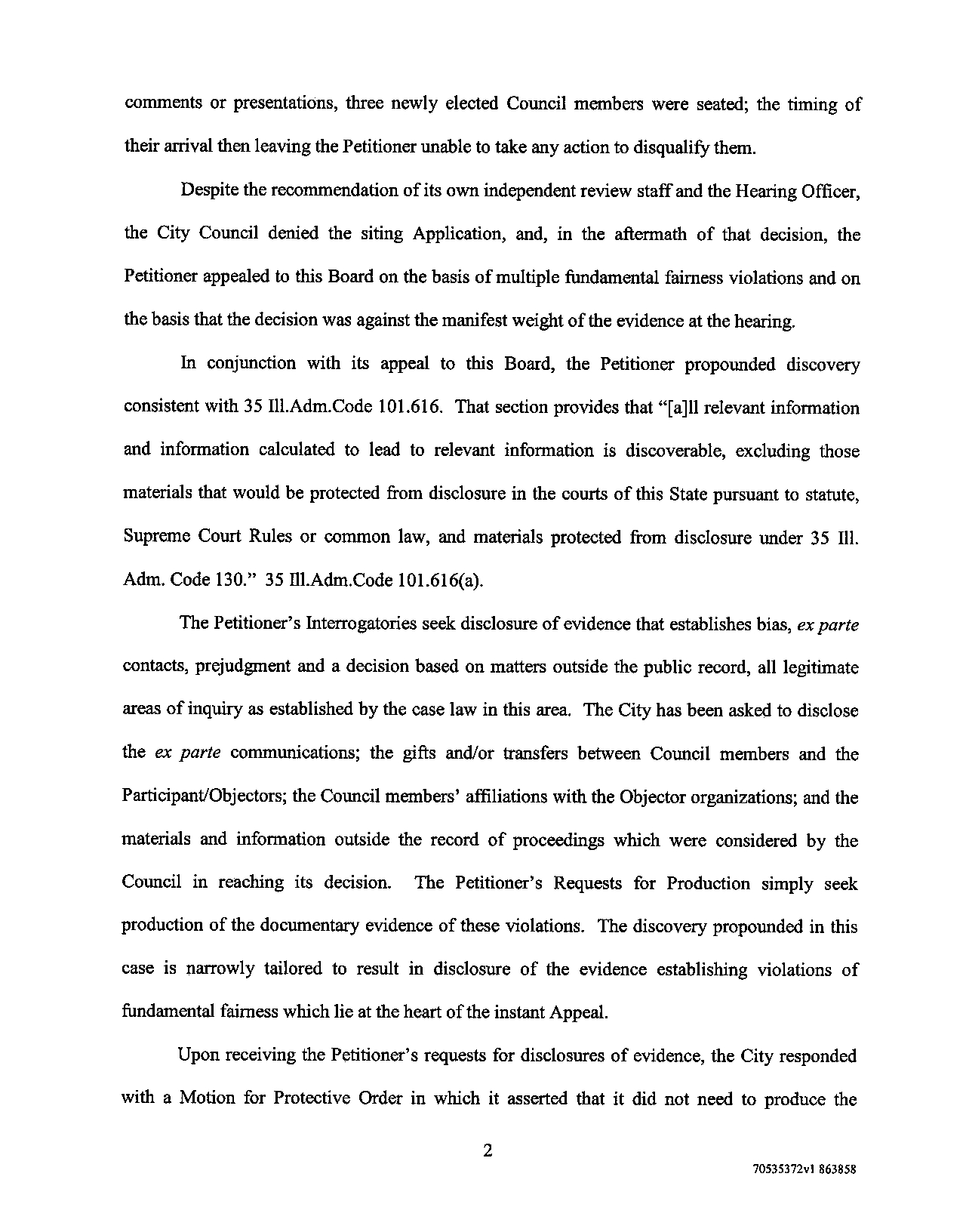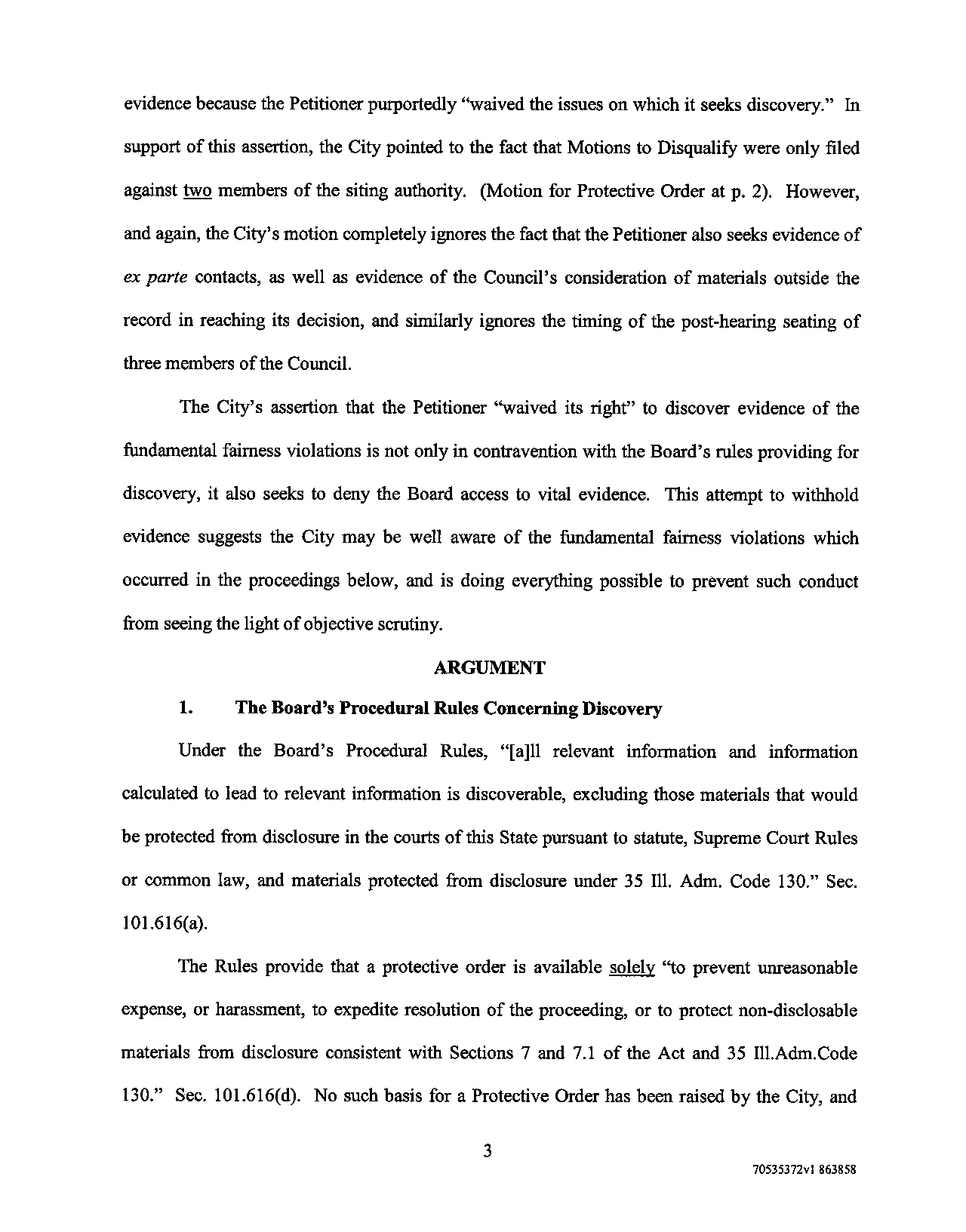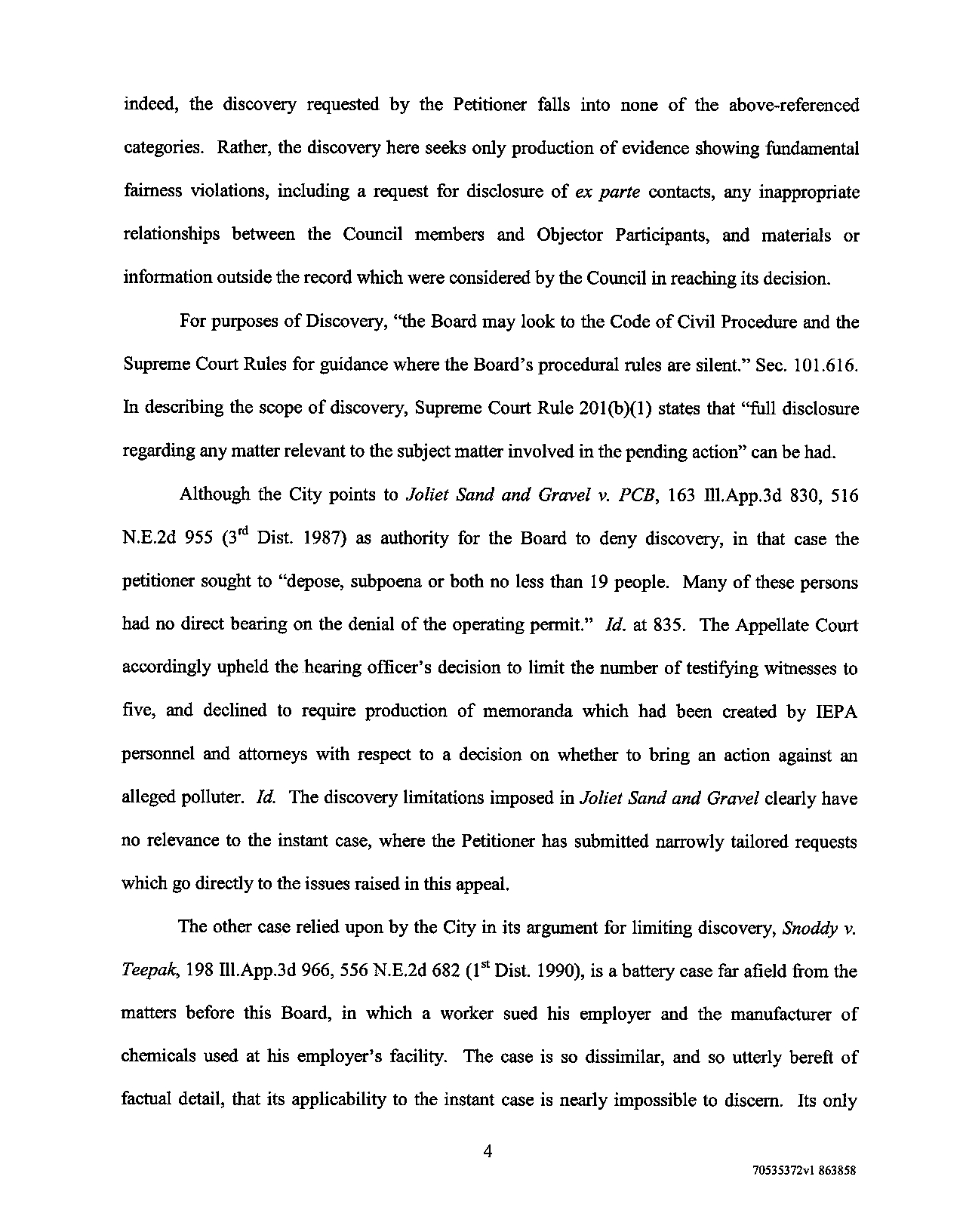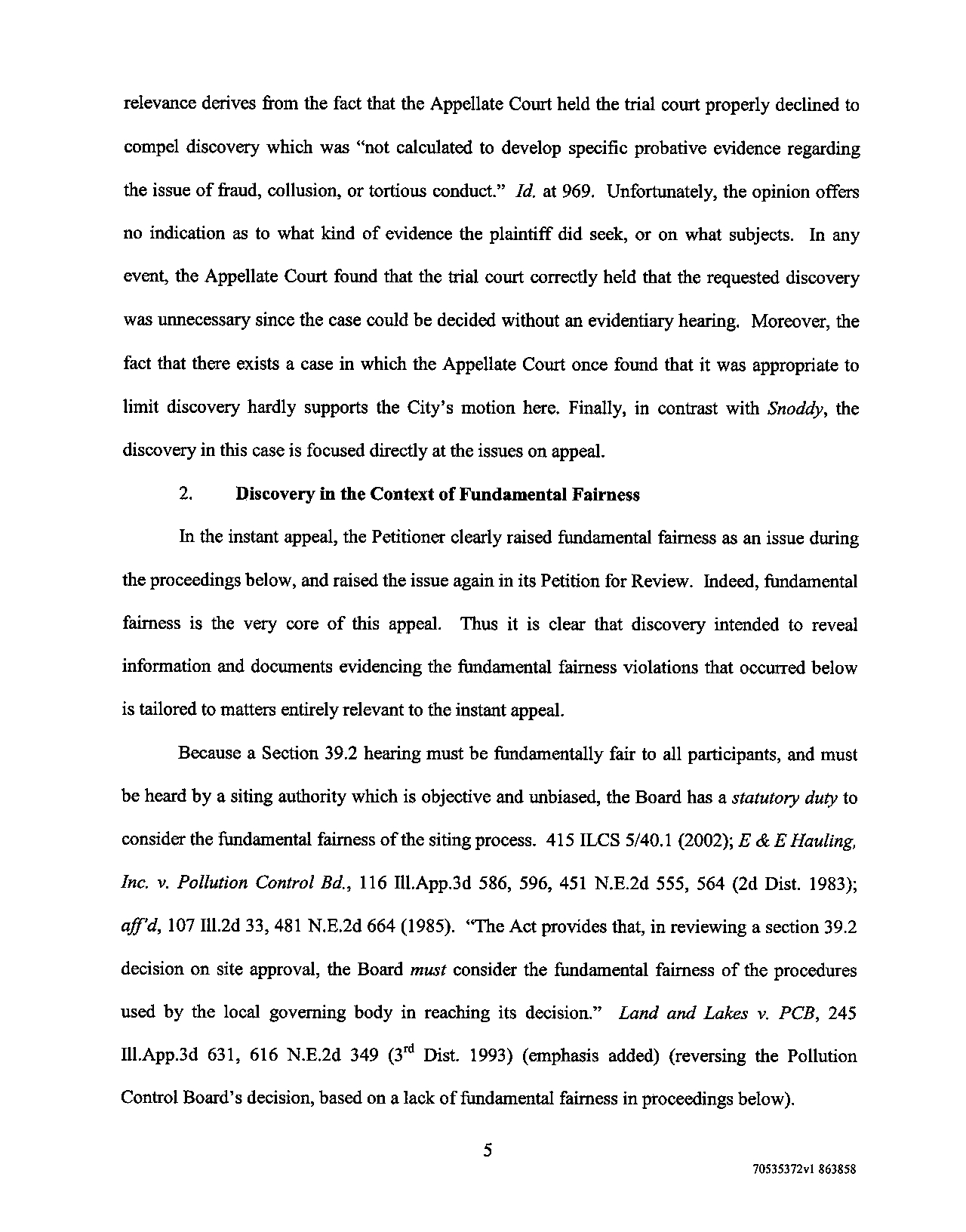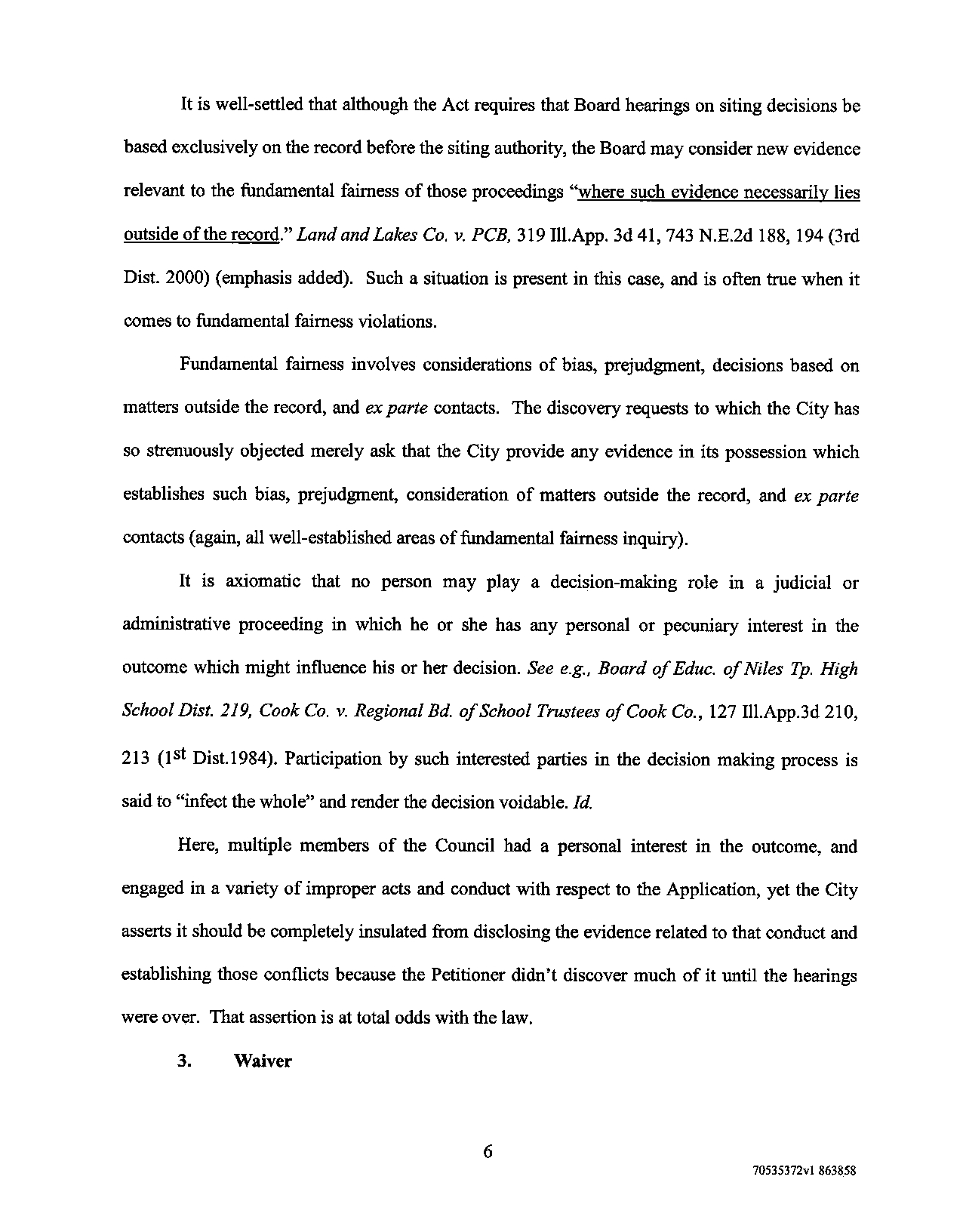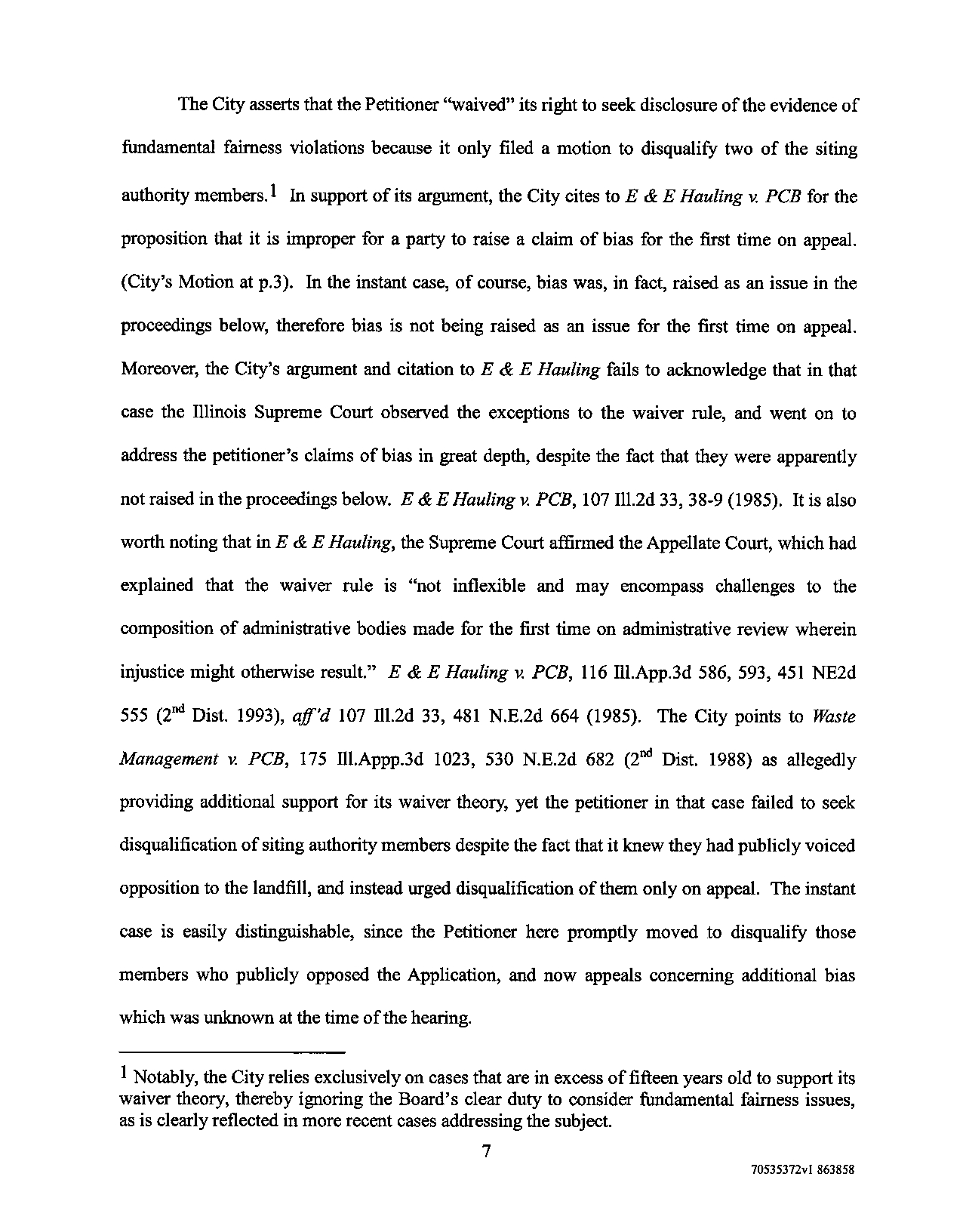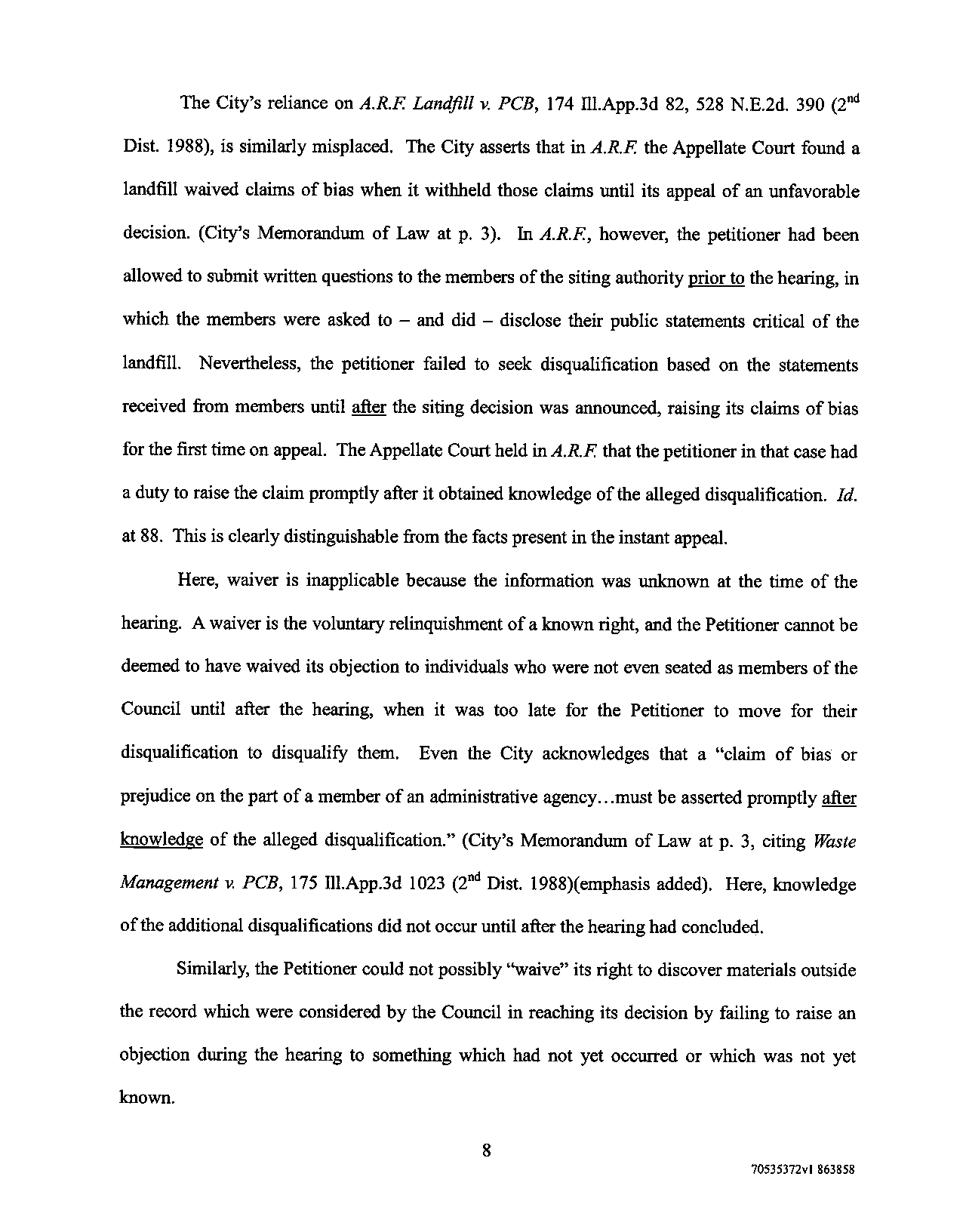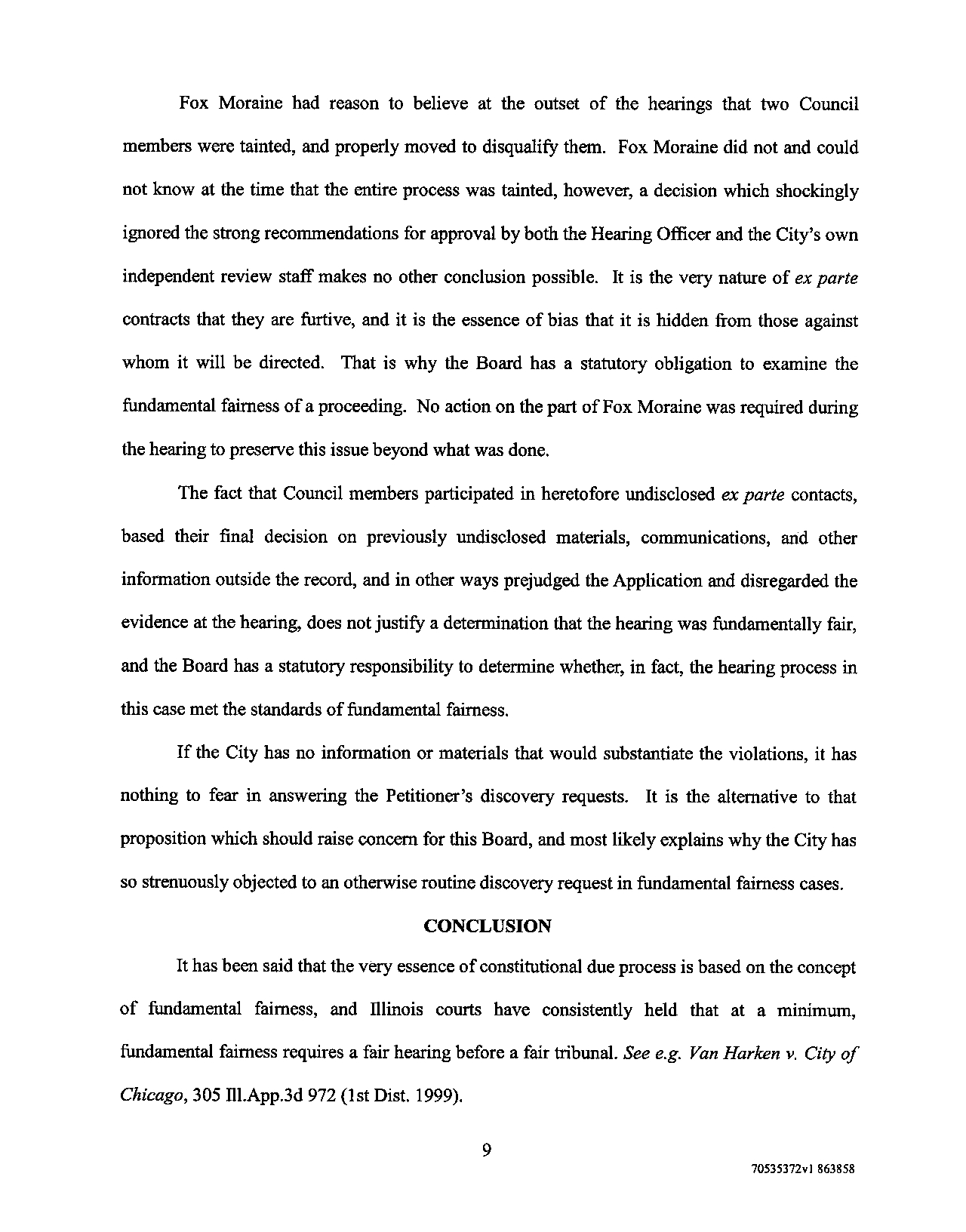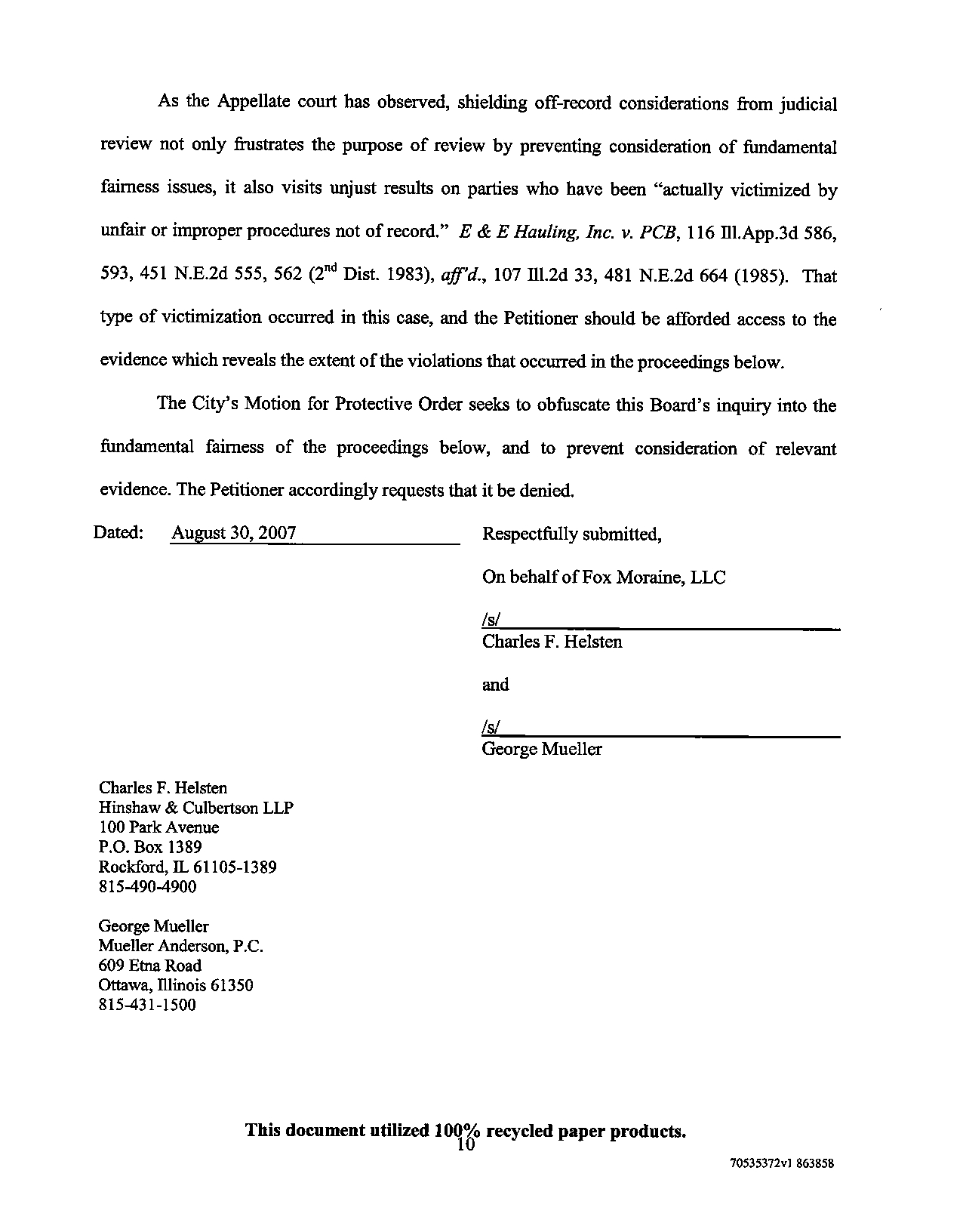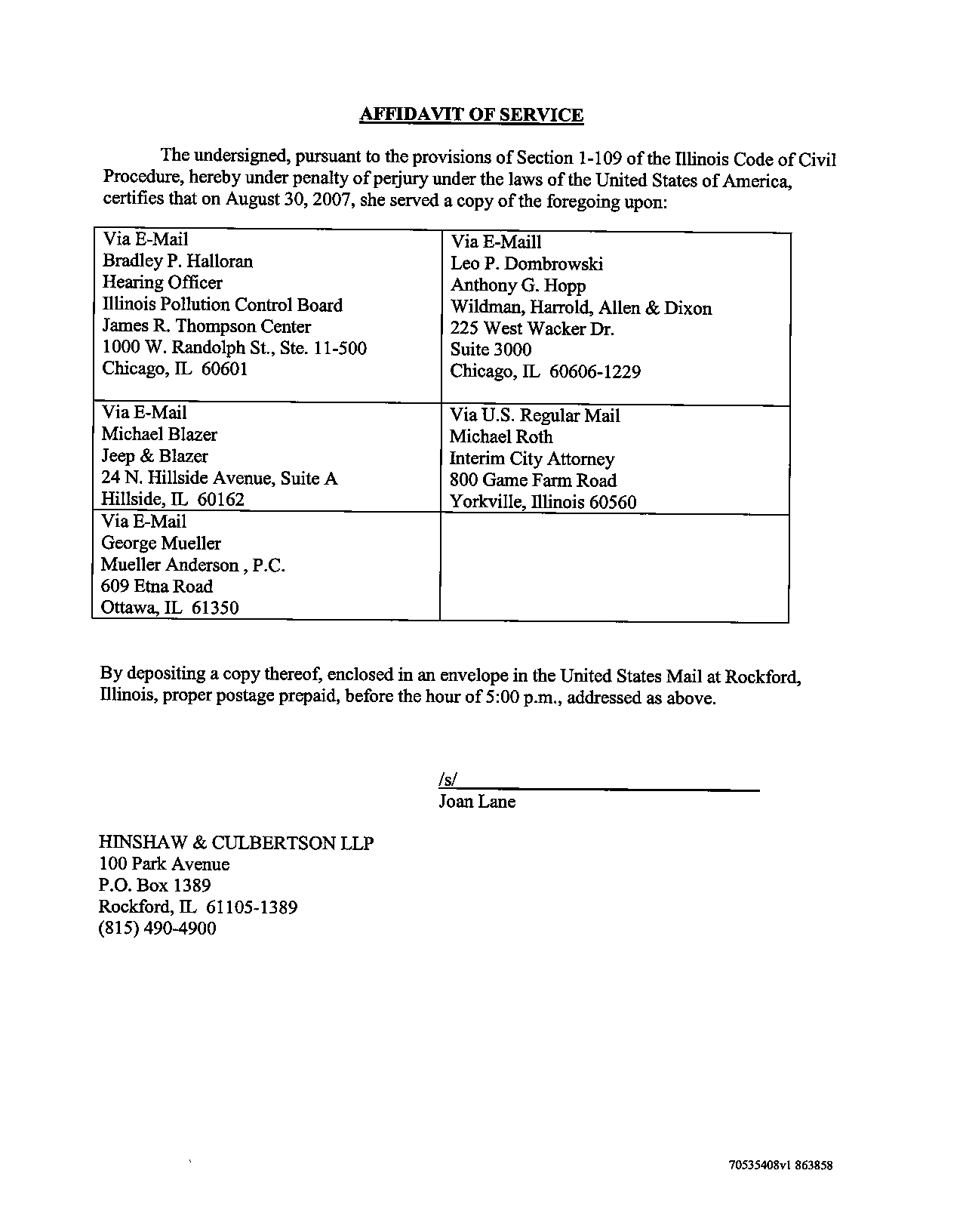BEFORE THE ilLINOIS POLLUTION CONTROL BOARD
FOX MORAINE, LLC,
Petitioner,
v.
UNITED CITY OF YORKVILLE, CITY
COUNCIL,
Respondent.
)
)
)
)
)
)
)
)
)
)
PCB No. PCB 07-146
NOTICE OF FILING
TO:
All counsel ofRecord (see attached Service List)
Please take notice that on August 30, 2007, the undersigned filed
with
the Illinois
Pollution Control Board, 100 West Randolph Street, Chicago, lllinois 60601,
the Petitioner's
Response to the Motion for Protective Order Limiting Discovery.
Dated:
August 30, 2007
Charles
F. Helsten
Hinshaw
&
Culbertson LLP
100 Park Avenue
P.O. Box 1389
Rockford, IL 61105-1389
815-490-4900
Respectfully submitted,
On
behalf of FOX MORAINE, LLC
lsi
Charles F. Helsten
One
ofIts Attorneys
This document utilized 100% recycled paper products.
10S3S423v! 863858
Electronic Filing, Received, Clerk's Office, August 30, 2007
BEFORE THE ILLINOIS POLLUTION CONTROL BOARD
Fox Moraine, L.L.C.,
Petitioner,
v.
United city ofYorkville, City Council,
Respondents.
)
)
)
)
)
)
)
)
)
PCB No. PCB No. 07-146
PETITIONER'S RESPONSE TO THE MOTION FOR
PROTECTIVE
ORDER LIMITING DISCOVERY
NOW COMES the Petitioner, FOX MORAINE, L.L.C., by and through its attorneys,
Charles F. Helsten and George Mueller, and in response to the Motion for a Protective Order
Limiting Discovery, states as follows:
INTRODUCTION
The gist of the City's Motion for Protective Order Limiting Discovery is that the
Petitioner did not preserve its right to challenge the fundamental fairness violations in the
proceedings below, and is therefore barred from discovering evidence
of those violations and
revealing that evidence in this appeal before the Board. The City's assertion is not only patently
false, it ignores this Board's Rules concerning discovery and is an affront to the very principles
of fundamental fairness.
The Petitioner, Fox Moraine, raised fundamental fairness concerns from the onset
of the
public hearing for siting approval, on March 7, 2007. (petition for Review, Exhibits B and C).
At the commencement of the hearing, the Petitioner filed a Motion to Disqualify in which it
delineated the bias demonstrated by two members of the Council based on their pre-hearing
expressions ofpublic opposition to the Application, their solicitation of legal advice for purposes
of opposing the Application, and a variety of other disqualifying conflicts of interest.
ld.
After
the close
of the siting hearing, when the rules prevented Fox Moraine from making any further
70535372vl 863858
comments or presentations, three newly elected Council members were seated; the timing of
their arrival then leaving the Petitioner unable to take any action to disqualify them.
Despite the recommendation
of its own independent review staffand the Hearing Officer,
the City Council denied the siting Application, and, in the aftermath of that decision, the
Petitioner appealed to this Board on the basis of multiple fundamental fairness violations and on
the basis that the decision was against the manifest weight of the evidence at the hearing.
In conjunction with its appeal to this Board, the Petitioner propounded discovery
consistent with 35 Ill.Adm.Code 101.616. That section provides that "[a]11 relevant information
and information calculated to lead to relevant information is discoverable, excluding those
materials that would be protected from disclosure in the courts of this State pursuant to statute,
Supreme Court Rules or common law, and materials protected from disclosure under 35 Ill.
Adm. Code
130." 35 Ill.Adm.Code 101.616(a).
The Petitioner's Interrogatories seek disclosure
of evidence that establishes bias,
ex parte
contacts, prejudgment and a decision based on matters outside the public record, all legitimate
areas
of inquiry as established by the case law in this area. The City has been asked to disclose
the
ex parte
communications; the gifts andlor transfers between Council members and the
Participant/Objectors; the Council members' affiliations with the Objector organizations; and the
materials and information outside the record of proceedings which were considered by the
Council in reaching its decision.
The Petitioner's Requests for Production simply seek
production
of the documentary evidence of these violations. The discovery propounded in this
case is narrowly tailored to result in disclosure of the evidence establishing violations of
fundamental fairness which lie at the heart ofthe instant Appeal.
Upon receiving the Petitioner's requests for disclosures
of evidence, the City responded
with a Motion for Protective Order in which it asserted that it did not need to produce the
2
70535372vl 863858
evidence because the Petitioner purportedly "waived the issues on which it seeks discovery."
In
support of this assertion, the City pointed to the fact that Motions to Disqualify were only filed
against two members
of the siting authority. (Motion for Protective Order at p. 2). However,
and again, the City'smotion completely ignores the fact that the Petitioner also seeks evidence of
ex parte
contacts, as well as evidence of the Council's consideration of materials outside the
record in reaching its decision, and similarly ignores the timing
of the post-hearing seating of
three members ofthe Council.
The City's assertion that the Petitioner "waived its right" to discover evidence
of the
fundamental fairness violations is not only
in contravention with the Board's rules providing for
discovery, it also seeks to deny the Board access to vital evidence. This attempt to withhold
evidence suggests the City
may be well aware of the fundamental fairness violations which
occurred in the proceedings below, and is doing everything possible
to prevent such conduct
from seeing the light
of objective scrutiny.
ARGUMENT
1.
The Board's Procedural Rules Concerning Discovery
Under the Board's Procedural Rules, "[a]l1 relevant infonnation and information
calculated to lead to relevant information is discoverable, excluding those materials that would
be protected from disclosure
in
the courts of this State pursuant to statute, Supreme Court Rules
or common law, and materials protected from disclosure under 35 Ill. Adm. Code 130." Sec.
101.616(a).
The Rules provide that a protective order is available solely ''toprevent unreasonable
expense, or harassment, to expedite resolution
of the proceeding, or to protect non-disclosable
materials from disclosure consistent with Sections 7 and
7.1 of the Act and 35 Ill.Adm.Code
130." Sec. 101.616(d). No such basis for a Protective Order has been raised by the City, and
3
70535372vl 863858
indeed, the discovery requested by the Petitioner falls into none of the above-referenced
categories. Rather, the discovery here seeks only production
of evidence showing fundamental
fairness violations, including a request for disclosure
of
ex parte
contacts, any inappropriate
relationships between the Council members and Objector Participants, and materials
or
infonnation outside the record which were considered by the Council in reaching its decision.
For purposes
of Discovery, "the Board may look
to
the Code of Civil Procedure and the
Supreme Court Rules for guidance where the Board'sprocedural roles are silent." Sec. 101.616.
In
describing the scope of discovery, Supreme Court Rule 201 (b)(1) states that "full disclosure
regarding any matter relevant to the subject matter involved in the pending action" can
be had.
Although the City points
to
Joliet Sand and Gravel
v.
PCB,
163 1ll.App.3d 830, 516
N.E.2d 955
(3
rd
Dist. 1987) as authority for the Board to deny discovery, in that case the
petitioner sought to "depose, subpoena
or both no less than 19 people. Many of these persons
had no direct bearing
on the denial of the operating pennit."
ld.
at 835. The Appellate Court
accordingly upheld the hearing officer's decision to limit the number
of testifying witnesses
to
five, and declined to require production of memoranda which had been created by IEPA
personnel and attorneys with respect to a decision
on whether to bring an action against an
alleged polluter.
ld.
The discovery limitations imposed in
Joliet Sand and Gravel
clearly have
no relevance to the instant case, where the Petitioner has submitted narrowly tailored requests
which go directly to the issues raised in this appeal.
The other case relied upon
by the City in its argwnent for limiting discovery,
Snoddy
v.
Teepak,
198 IlI.App.3d 966,556 N.E.2d 682 (1
st
Dist. 1990), is a battery case far afield from the
matters before this Board, in which a worker sued his employer and the manufacturer
of
chemicals used at his employer's facility. The case is so dissimilar, and so utterly bereft of
factual detail, that its applicability to the instant case is nearly impossible to discern. Its only
4
70535372vl 863858
relevance derives from the fact that the Appellate Court held the trial court properly declined to
compel discovery which was
"not calculated to develop specific probative evidence regarding
the issue
of fraud, collusion, or tortious conduct."
Id.
at 969. Unfortunately, the opinion offers
no indication as to what kind
of evidence the plaintiff did seek, or on what subjects. In any
event, the Appellate Court found that the trial court correctly held that the requested discovery
was unnecessary since the case could
be decided without an evidentiary hearing. Moreover, the
fact that there exists a case in which the Appellate Court once found that
it was appropriate to
limit discovery hardly supports the City's motion here. Finally, in contrast with
Snoddy,
the
discovery in this case is focused directly at the issues
on appeal.
2.
Discovery in the Context of Fundamental Fairness
In
the instant appeal, the Petitioner clearly raised fundamental fairness as an issue during
the proceedings below, and raised the issue again in its Petition for Review. Indeed, fundamental
fairness is the very core
of this appeal. Thus it is clear that discovery intended to reveal
infonnation and documents evidencing the fundamental fairness violations that occurred below
is tailored to matters entirely relevant to the instant appeal.
Because a Section 39.2 hearing must
be fundamentally fair to all participants, and must
be heard by a siting authority which is objective and unbiased, the Board has a
statutory duty
to
consider the fundamental fairness
ofthe siting process. 415 ILCS
5/40.1
(2002);
E
&
E Hauling,
Inc.
v.
Pollution Control Bd.,
116 Ill.App.3d 586, 596, 451 N.E.2d 555, 564 (2d Dist. 1983);
aff'd,
107 Ill.2d 33, 481 N.E.2d 664 (1985). "The Act provides that, in reviewing a section 39.2
decision
on site approval, the Board
must
consider the fundamental fairness of the procedures
used
by the local governing body in reaching its decision."
Land and Lakes
v.
PCB, 245
Ill.App.3d 631, 616 N.E.2d 349 (300 Dist. 1993) (emphasis added) (reversing the Pollution
Control Board'sdecision, based on a lack
of fundamental fairness in proceedings below).
5
70535372vl 863858
It is well-settled that although the Act requires that Board hearings on siting decisions be
based exclusively on the record before the siting authority, the Board may consider new evidence
relevant to the fundamental fairness
of those proceedings "where such evidence necessarily lies
outside of the record."
Land and Lakes Co.
v.
PCB,
31911LApp. 3d 41, 743 N.E.2d 188, 194 (3rd
Dist. 2000) (emphasis added). Such a situation is present in this case, and is often true when it
comes to fundamental fairness violations.
Fundamental fairness involves considerations
of bias, prejudgment, decisions based on
matters outside the record, and
ex parte
contacts. The discovery requests to which the City has
so strenuously objected merely ask that the City provide any evidence in its possession which
establishes such bias, prejudgment, consideration
of matters outside the record, and
ex parte
contacts (again, all well-established areas of fundamental fairness inquiry).
It
is axiomatic that no person may playa decision-making role
In
a judicial or
administrative proceeding
in
which he or she has any personal or pecuniary interest in the
outcome which might influence his or her decision.
See e.g., Board ofEduc. ofNiles Tp. High
School Dist.
219,
Cook Co.
v.
Regional Bd. ofSchool Trustees ofCook Co.,
127 Ill.App.3d 210,
213 (1st Dist.1984). Participation
by such interested parties
in
the decision making process is
said to "infect the whole" and render the decision voidable.
ld.
Here, multiple members of the Council had a personal interest in the outcome, and
engaged in a variety
of improper acts and conduct with respect to the Application, yet the City
asserts it should be completely insulated from disclosing the evidence related to that conduct and
establishing those conflicts because the Petitioner didn't discover much
of it until the hearings
were over. That assertion is at total odds with the law.
3.
Waiver
6
70535372vl 8638.58
The City asserts that the Petitioner ''waived''its right to seek disclosure of the evidence of
fundamental fairness violations because it only filed a motion to disqualify two of the siting
authority members. 1 In support
of its argument, the City cites to
E
&
E Hauling
v.
PCB
for the
proposition that it is improper for a party to raise a claim
of bias for the first time on appeal.
(City's Motion at p.3).
In
the instant case, of course, bias was, in fact, raised as an issue in the
proceedings below, therefore bias is not being raised as an issue for the first time on appeal.
Moreover, the City's argument and citation to
E
&
E
Hauling
fails to acknowledge that in that
case the Illinois Supreme Court observed the exceptions to the waiver rule, and went on to
address the petitioner's claims
of bias in great depth, despite the fact that they were apparently
not raised
in the proceedings below.
E
&
E Hauling
v.
PCB,
107 Il1.2d 33,38-9 (1985). It is also
worth noting that in
E
&
E Hauling,
the Supreme Court affirmed the Appellate Court, which had
explained that the waiver rule is "not inflexible and may encompass challenges to the
composition
of administrative bodies made for the first time on administrative review wherein
injustice might otherwise result."
E
&
E
Hauling
v.
PCB,
116 I11.App.3d 586, 593, 451 NE2d
555 (2
nd
Dist. 1993),
ajJ'd
107 1ll.2d 33, 481 N.E.2d 664 (1985). The City points to
Waste
Management
v.
PCB,
175 Ill.Appp.3d 1023, 530 N.E.2d 682 (2
nd
Dist. 1988) as allegedly
providing additional support for its waiver theory, yet the petitioner in that case failed to seek
disqualification ofsiting authority members despite the fact that it knew they had publicly voiced
opposition to the landfill, and instead urged disqualification
of them only on appeal. The instant
case is easily distinguishable, since the Petitioner here promptly moved to disqualify those
members who publicly opposed the Application, and now appeals concerning additional bias
which was unknown at the time
ofthe hearing.
1 Notably, the City relies exclusively
on cases that are in excess of fifteen years old to support its
waiver theory, thereby ignoring the Board's clear duty to consider fundamental fairness issues,
as is clearly reflected in more recent cases addressing the subject.
7
70535372vl 863858
The City's reliance on
A.R.R Landfill v. PCB,
174 m.App.3d 82, 528 N.E.2d. 390 (2
nd
Dist. 1988), is similarly misplaced. The City asserts that
in
A.R.F
the Appellate Court found a
landfill waived claims
of bias when it withheld those claims until its appeal of
an
unfavorable
decision. (City's Memorandum
of Law at p. 3).
In
A.R.R,
however, the petitioner had been
allowed to submit written questions to the members
of the siting authority prior to the hearing, in
which the members were asked
to - and did - disclose their public statements critical of the
landfill. Nevertheless, the petitioner failed to seek disqualification based
on the statements
received from members until after the siting decision was announced, raising its
claims of bias
for the first time
on appeal. The Appellate Court held in
A.R.F
that the petitioner in that case had
a duty to raise the claim promptly after it obtained knowledge of the alleged disqualification.
Id.
at 88. This is clearly distinguishable from the facts present in the instant appeal.
Here, waiver is inapplicable because the information was unknown at the time
of the
hearing. A waiver is the voluntary relinquishment
of a known right, and the Petitioner cannot be
deemed to have waived its objection to individuals who were not even seated as members of the
Council until after the hearing, when it was too late for the Petitioner to move for their
disqualification to disqualify them. Even the City acknowledges that a "claim
of bias or
prejudice on the part of a member of
an
administrative agency...must be asserted promptly after
knowledge
of the alleged disqualification." (City's Memorandum of Law at p. 3, citing
Waste
Management v. PCB,
175 Ill.App.3d 1023 (2
nd
Dist. 1988)(emphasis added). Here, knowledge
ofthe additional disqualifications did not occur until after the hearing had concluded.
Similarly, the Petitioner could not possibly "waive" its right to discover materials outside
the record which were considered
by the Council in reaching its decision by failing to raise an
objection during
the hearing to something which had not yet occurred or which was not yet
known.
8
7053 5372v I 863858
Fox Moraine had reason to believe at the outset of the hearings that two Council
members were tainted, and properly moved to disqualify them. Fox Moraine did not and could
not know at the time that the entire process was tainted, however, a decision which shockingly
ignored the strong recommendations for approval by both the Hearing Officer and the City'sown
independent review staff makes no other conclusion possible.
It
is the very nature of
ex parte
contracts that they are furtive, and it is the essence of bias that it is hidden from those against
whom it will be directed. That is why the Board has a statutory obligation to examine the
fundamental fairness of a proceeding. No action on the part of Fox Moraine was required during
the hearing to preserve this issue beyond what was done.
The fact that Council members participated
in heretofore undisclosed
ex parte
contacts,
based their final decision on previously undisclosed materials, communications, and other
infonnation outside the record, and in other ways prejudged the Application and disregarded the
evidence at the hearing, does not justify a determination that the hearing was fundamentally fair,
and the Board
has
a statutory responsibility to determine whether, in fact, the hearing process in
this case met the standards of fundamental fairness.
If the City has no infonnation or materials that would substantiate the violations, it has
nothing
to
fear
in
answering the Petitioner's discovery requests. It is the alternative to that
proposition which should raise concern for this Board, and most likely explains why the City has
so strenuously objected to an otherwise routine discovery request in fundamental fairness cases.
CONCLUSION
It has been said that the very essence of constitutional due process is based on the concept
of fundamental fairness, and TIlinois courts have consistently held that at a minimum,
fundamental fairness requires a fair hearing before a fair tribunal.
See e.g. Van Harken v. City of
Chicago,
305 m.App.3d 972 (1st Dist. 1999).
9
70535372vl 863858
As the Appellate court
has
observed, shielding off-record considerations from judicial
review not only frustrates the pwpose of review by preventing consideration of fundamental
fairness issues, it also visits unjust results on parties who have been "actually victimized by
unfair or improper procedures not of record,"
E
&
E Hauling, Inc. v.
PCB,
116 m.App.3d 586,
593, 451 N.E.2d 555, 562 (2
nd
Dist. 1983),
aff'd.,
107 n1.2d 33, 481 N.E.2d 664 (1985). That
type of victimization occurred in this case, and the Petitioner should be afforded access to the
evidence which reveals the extent ofthe violations that occurred in the proceedings below.
The City's Motion for Protective Order seeks to obfuscate this Board's inquiry into the
fundamental fairness of the proceedings below, and to prevent consideration of relevant
evidence. The Petitioner accordingly requests that it be denied.
Dated:
August 30, 2007
Charles F. Helsten
Hinshaw
&
Culbertson LLP
100 Park Avenue
P.O. Box 1389
Rockford,
IL
61105-1389
815-490-4900
George Mueller
Mueller Anderson, P.c.
609 Etna Road
Ottawa, TIlinois 61350
815-431-1500
Respectfully submitted,
On behalf of Fox Moraine, LLC
lsi
Charles F. Helsten
and
lsi
George Mueller
This document utilized 1
O~~
recycled paper products.
70535372vl 863858
AFFIDAVIT OF SERVICE
The undersigned, pursuant to the provisions of Section 1-109 of the nlinois Code of Civil
Procedure, hereby under penalty
ofperjury under the laws of the United States of America,
certifies that on August
30, 2007, she served a copy ofthe foregoing upon:
Via E-Mail
ViaE-Main
Bradley P. Halloran
Leo
P. Dombrowski
Hearing Officer
Anthony
G. Hopp
Illinois Pollution Control Board
Wildman, Harrold, Allen
&
Dixon
James
R
Thompson Center
225 West Wacker Dr.
1000 W. Randolph St., Ste. 11-500
Suite 3000
Chicago, IL 60601
Chicago,IL 60606-1229
ViaE-Mail
Via U.S. Regular Mail
Michael Blazer
Michael Roth
Jeep
&
Blazer
Interim City Attorney
24
N. Hillside Avenue, Suite A
800 Game Fann Road
Hillside, IL 60162
Yorkville, lllinois 60560
ViaE-Mail
George Mueller
Mueller
Anderson, P.C.
609 Etna Road
Ottawa,
IL 61350
By depositing a copy thereof, enclosed in an envelope in the United States Mail at Rockford,
Dlinois, proper postage prepaid, before the
hour of 5:00 p.m., addressed as above.
lsi
Joan Lane
HINSHAW
&
CULBERTSON LLP
100
Park Avenue
P.O.
Box 1389
Rockford, IL 61105-1389
(815) 490-4900
70535408vl 863858
